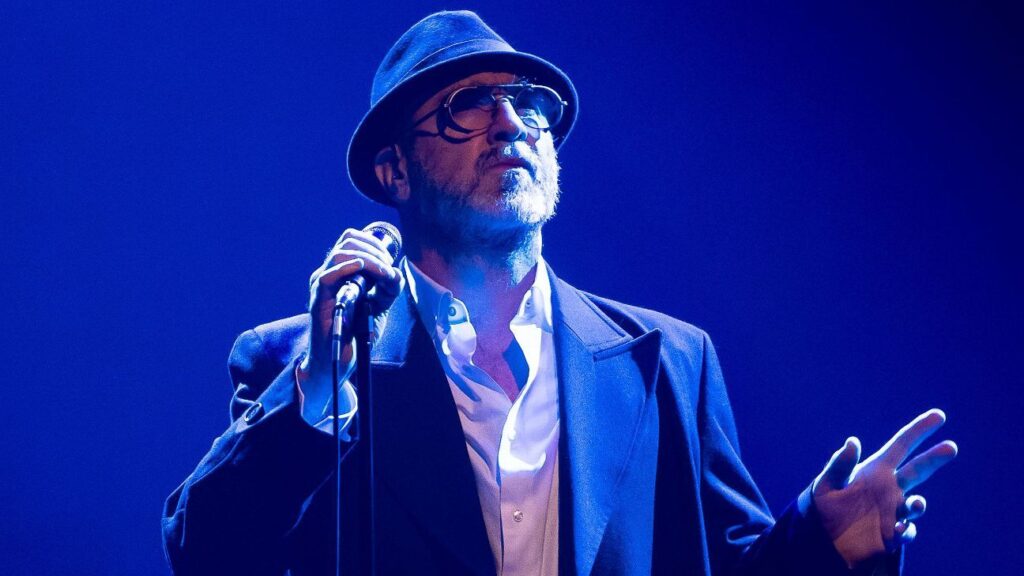LONDON — “I’ve been heroic / I’ve been criminal / I’ve been angelic / I’ve been infernal/ You hate me/ You love me/ I’m only judged by myself.” Manchester United legend Eric Cantona is back performing in front of a crowd, re-modelled as a world-weary troubadour, and the lyrics he sings at the start of his live show are exactly as you would expect.
A stripped-back version of the autobiographical “I’ll Make My Own Heaven,” which begins his set at London’s Bloomsbury Theatre as part of a 13-stop European tour performing his first collection of songs, refers to the most infamous moment of Cantona’s footballing career: The night he leapt into the crowd and kung-fu kicked a Crystal Palace fan after being sent off at Selhurst Park in 1995, earning him a nine-month ban and a 14-day prison sentence for the incident — later reduced to 120 hours of community service.
– Stream on ESPN+: LaLiga, Bundesliga, more (U.S.)
Perhaps unsurprisingly, Cantona’s sound is an unsteady mix of Nick Cave, Serge Gainsbourg and late-era Leonard Cohen. His heavy French accent and gruff, melancholic singing voice, while pleasant on his debut EP, loses some of its consistency when heard live, but there is some craftmanship in his chansons, the majority of which he wrote on his own with a guitar during the COVID-19 lockdowns.
The audience can broadly be divided into three categories: middle-aged United fan, spouse of middle-aged United fan, and child of middle-aged United fan. They could be forgiven for being a little slow to fall under Cantona’s spell, as the show was due to begin just two hours after United were beaten 3-0 by Manchester City at Old Trafford, but the near sell-out crowd was instantly enraptured by the man they still call “The King.” He lived up to the name as he took to the stage wearing a long dark trench coat, trilby hat, crisp white shirt and blood-red tracksuit bottoms and boots and stood, with arms outstretched in a messiah-like pose, drinking in the adulation.
Before the show, when asked why they had each paid £50 ($60) to see an ex-footballer’s attempt to break into the world of music, everyone gave the same answer: “It’s Eric.” There were fans who had travelled from Bristol, Southampton and Cantona’s native France to be in the presence of one of United’s — and the Premier League’s — greatest-ever players.
But Cantona is more than just a footballer. Despite playing his last match 26 years ago, he continues to affect people in a way other players do not. His devotees had heeded the call, snapped up the tickets and come to worship at the altar of Cantona. While some showed their reverence discreetly, others proudly wore United shirts with “Cantona No. 7” on the back. One man even had a tattoo of his hero’s name on his wrist. The enduring cult of Cantona was fed into by the lyric book given to each audience member, allowing everyone present to hang on his every word.
Of course, music is not the only artistic endeavour that Cantona has thrown himself into since announcing his shock retirement from football at the age of 30 in 1997. While his forays into poetry and oil painting have not proved fruitful, his acting talents have seen him star in more than 30 films. His performance as an imaginary version of himself in the Ken Loach-directed “Looking for Eric” received critical acclaim. In one scene the film’s main character, postman Eric Bishop (played by Steve Evets), says to his sporting hero: “Sometimes we forget that you’re just a man.” To which the United legend replies: “I am not a man… I am Cantona.”
Before winning five English league titles in seven seasons, Cantona grew up listening to his parents playing opera at home in Marseille before he later discovered punk and eventually perhaps his greatest musical inspiration, The Doors. Frontman Jim Morrison’s influence can certainly be heard on Cantona’s slightly apocalyptic, “Je Veux” (“I Want.”) As Cantona moves through his setlist, members of the crowd tried to interact with their hero; intermittent shouts of “Come on Eric!” more suited to accompanying him bearing down on an opposition goalkeeper with the ball at his feet, rather than bearing his heart out on stage.
As was the case when he quoted William Shakespeare’s “King Lear” to much bemusement as he accepted an award at a UEFA ceremony in 2019, the ambitions of Cantona’s artistic expression can at times leave some of his audience behind. At one point during the gig, his musings on an astronaut looking back on the world from space were awkwardly received with nervous laughter from the crowd. But when he gets it right, as he does with the genuinely captivating “Where Love Is Hanging Out,” Cantona can still draw an emotional response from a crowd.
It’s fair to say that Cantona is used to being misunderstood. When he first arrived in England at Leeds United in 1992, a reporter asked him who his hero was. Cantona answered: “[Arthur] Rimbaud,” (the French surrealist poet) but his response was mis-transcribed as “Rambo” — causing fans to bring photos of Sylvester Stallone to Elland Road in a misguided attempt at support for their new forward.
Cantona’s artistic journey post-football really is quite remarkable. It is hard to imagine an elite footballer today making the same leap into the world of the arts. Kevin De Bruyne contemplating the pitfalls of modern society through the medium of interpretive dance? Unlikely. Mason Mount penning an epic lament to a life left unlived? A tantalising prospect, but unfortunately not on the cards. But there he is, the Premier League’s overseas player of the decade 1992-2002, up there on stage and midway through a headline tour, crooning to a delighted audience: “I feel like a lizard / I’ve never been a lizard / But I can imagine / Because I drink / A sex on the beach.”
Perhaps it was inevitable that Cantona would end up as a musician. He always was the Premier League’s rock star, an extravagant free-thinker with a natural distrust of authority and a strained relationship with the law. His natural charisma really is something to behold in the intimate London theatre. Not even his former manager, the notoriously stoic Sir Alex Ferguson, could resist what he called Cantona’s “defiant charisma” and he would allow the mercurial forward more slack than he would permit other members of his squad.
That being said, for a man with only four studio-recorded songs, the hour-and-a-half-long set did seem slightly extravagant. But then as with his football and acting careers, perhaps he knows his best work is done over 90 minutes. Cantona himself admits that he has a need to be seen. He told The Guardian earlier this year: “I did it just to go on stage, because I love the connection with an audience — football, theatre, music. And music, for me, was the dream. It was in sport; now, it’s in any kind of art. If I don’t have the opportunity to express myself, I prefer to die. I just need challenge. To feel alive, I need to feel fire inside me.”
Cantona saves his most famous quote for last in the show’s closer, “I Love You So Much,” an unapologetic love letter to the United faithful in the song. “When the seagulls follow the trawler it is because they think sardines will be thrown into the sea,” he sings with a smirk, referencing his iconic news conference that followed the incident at Palace. He continues: “Then the press called me the greatest philosopher who ever lived. They were completely right.”
Our last glimpse of the man before he departs the stage is him standing with his chest pumped out, scanning his audience, soaking up the adoration in the same way he did after one of his most famous United goals: A slalom run and chip against Sunderland on Dec. 21, 1996. And almost three decades later, that is perhaps what everyone is here for; not for his music, but to bask in Cantona’s presence just one more time.




